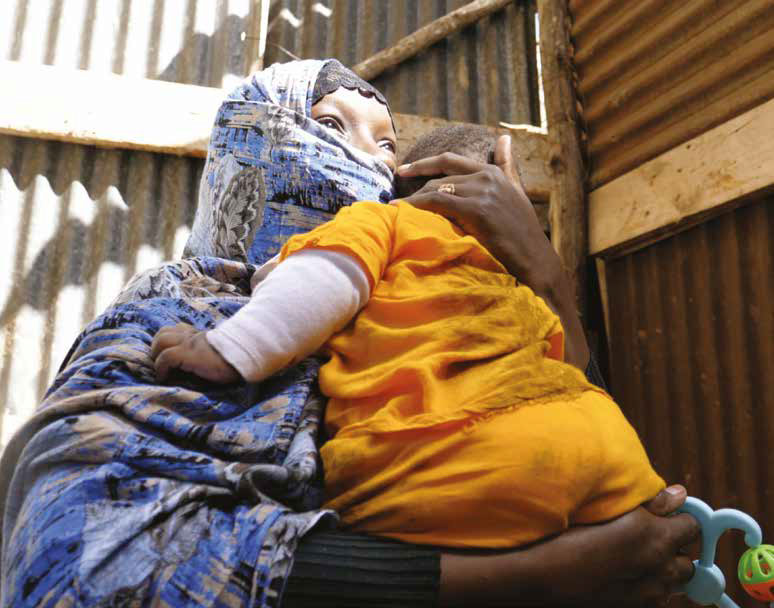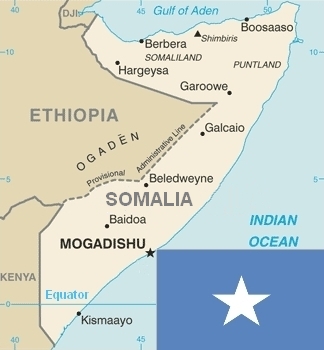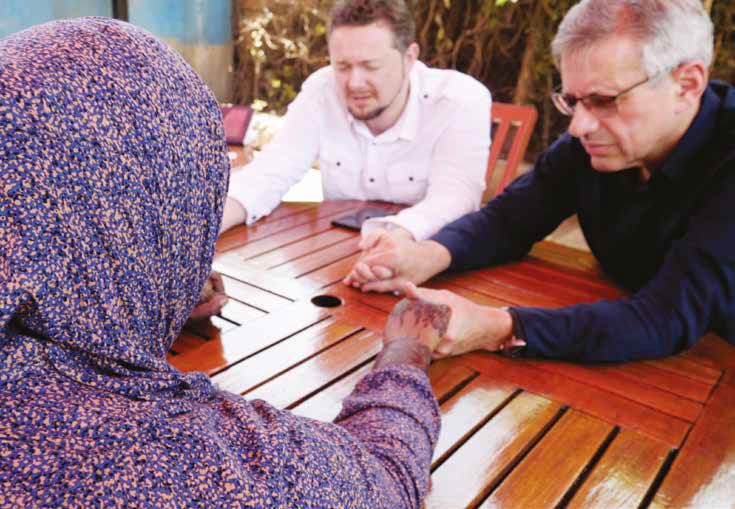
Despite forsaking everything to follow Christ many Somali believers find the church in their new homelands unwelcoming and distrustful. However, thanks to your support, our partners are able to provide them with vital practical and spiritual care, writes Release International’s Ben Gardner
If you mention the word ‘safari’ (or ‘safar’ as it is known in Somalia) it no doubt conjures up images of Land Rovers rolling across the African plains with excited tourists taking photographs of the native wildlife.
However, the Swahili word ‘safari’ more accurately means ‘journey’, which turns out to be how our brothers and sisters who have escaped Somalia often refer to their walk of faith with Jesus. They all use a similar expression: ‘We have left but we haven’t arrived.’
Despite committing their lives to Christ, and fleeing their Muslim families, they are not yet welcomed by fellow believers and in fact many are distrusted.
Recently we met ‘Lula’, who had to leave her family after coming to know Jesus. Her father publicly said, ‘I’m not afraid of going to jail; if you see her, kill her.’ She fled to another country, but her brothers followed her there.
Forced to hide in a house for months on end, she lived with the realisation that she could be found at any moment. However, while praying one day, she felt the Lord ask her how long she would hide from human beings.
Suitably convicted, she left the house and went to the market where she met her brother. As expected he threatened her, but she told him that she would scream if he tried anything. As a result she was able to walk away unharmed; but more than that, she was able to testify that God delivered her from fear of human beings that day.
However, Lula’s family continued to pursue her, and one day she returned home to find her house had been demolished, with all her belongings taken.
In spite of all the hostility from her family, she told us of her great love for them, and a passion to see them come to know Jesus. She has continued to reach out to them and, when her father died, she found a way to go to the funeral, despite the risk to her own life.
Lula shared the impact of meeting our partners. Until that point, she had been struggling to make a living, as well as to become part of a community. As a Muslim-background believer (MBB) as well as coming from a different country, she told us the local churches distrusted her, believing she was either a spy or a terrorist. It reminded us of the apostle Paul and how distrustful the early believers were of his conversion. Meeting our partner ‘Abdul’ changed all that for Lula, just as meeting Ananias led to Paul’s acceptance in Acts chapter 9.
With the support of Abdul and his team Lula now has a job providing milk for local schools. The team also helped to rebuild her house and bring her into a community of like-minded believers. They meet regularly, and she is now taking a leadership role herself.
In fact Lula is even helping to translate the Bible into her mother tongue so that her countrymen might be able to read it. However, the work she is doing is raising her profile again. ‘I know what this is going to cost me, but He has been with me through all my journey and in my bad times.’
‘God used al-Shabaab’
Another Somali who has been helped by our partners is Pastor ‘Samuel’, who as an imam came to know Jesus through the work of a missionary doctor in 1987.
After telling his father that he had come to faith in Jesus, he was tied up and then held in an underground cell until a group of believers were able to free him. He fled the country and over time began a new life, marrying, having children and serving his local church as a pastor and evangelist. As a result of his teaching ministry many Muslims in his new homeland came to know the Lord.
‘Somalia used to be a closed door, but…
now there is space for them to hear the gospel.’
But his story did not end there.
A Somali group tracked him down, and offered his wife thousands of pounds to take his children away from him. She agreed and left Samuel, moving back to Somalia. He told us: ‘It was only after then that things really started!’ Following an open-air religious debate he was beaten and left for dead and, after the terrorist group al-Shabaab discovered his whereabouts, a fatwa was declared against him. Sadly even his church began to abandon him out of fear, but, with obvious gratitude he declared: ‘The Lord helped me.’
In an effort to seize Samuel, al- Shabaab began to publish his story on billboards and even showed a YouTube video of him in various marketplaces. ‘The most wonderful thing was that God was using that to preach the gospel; they were preaching the gospel to those I could never reach!’
For Samuel it was a challenging time, living alone and in hiding, unable even to attend church.
‘Every time I am persecuted, I see the Lord’s
hand moving in the midst of it.’
However, Abdul and his team were able to help, befriending him and offering support, protection and friendship.
When the immediate risk to his life had passed, Samuel began to rebuild the community of Muslim-background believers (MBBs). He was acutely aware of MBBs who had ‘left but not arrived’, and he strongly felt that discipleship of these new believers was essential to ensure they were not lost through loneliness and isolation. He actually had a young believer living with him when we visited, a man whose conversion had led to his wife and children leaving him.
‘I will share my house and my food with our brothers who come to me; we want a safe place where our brothers can feel loved, and know that they have a family and a community,’ Samuel said.
‘Somalia used to be a closed door, but now it is much more open. People are hungry. They are tired of war. They have been shaken, and now there is space for them to hear the gospel.‘
‘When I see my community suffering, I must help them. Furthermore, every time I am persecuted, I see the Lord’s hand moving in the midst of it.’
Please pray for Samuel’s safety and protection and for his efforts to disciple MBBs.
‘Evil’ religion
The journey of faith began for ‘Amanda’ when she heard of Muslim women in her community who had converted to Christianity. She had always been taught that Christianity was an evil religion, and that Christians were mean. As a result she was passionate to ‘win them back’.
However, when she met these women, and a foreign doctor who spoke her native language, she was confused. These people were generous and kind.
She was also amazed that she did not need to learn a new language to find out about their God – ‘In Islam, Allah only speaks Arabic. Here is a God who is willing to speak to me in my mother tongue.’
Eventually, Amanda built up the courage to tell her husband that she had been meeting with Christians. She asked him if he would like to go along to meet them but he forced her into the shower and told her to wash. ‘You’ve been to a dirty place,’ he said angrily.
Despite her husband’s reaction, she decided to meet the Christians again; it was then that she gave her life to Christ. When she returned home, her husband was waiting for her. He beat her and locked her in a room.He even stopped her from seeing her son.
After a year of being mistreated, he finally left her; she was alone, grateful that the abuse had stopped but now without a job or a home.
Despite this, she said, she came to know that God loved her, and that He cared for her: ‘In Islam, even our husbands never tell us they love us, but here is God telling me that He loves me!’
Our partners have helped her to set up a shop so she can make a living. And, despite great risk, she
reaches out to women in the Muslim community in the hope that she can lead some to Christ.
Because the local churches are afraid of MBBs and tend to shun them, while their families either want to harm them or have nothing to do with them, the support and community our partners offer these ‘underground’ believers are crucial. Through your prayers and financial support, they are helping them to ‘safari njema’ or ‘journey well’.
- Abdul and his team, in addition to supporting believers on the ground, also have many projects for reaching out into Somalia, including radio and social media. Please pray for the growth of this ministry and its impact.
* Names in inverted commas have been changed to protect identities
SOMALIA

Population: 12.1 to 16.3 million (estimated)
Capital: Mogadishu
Government: Federal Parliamentary Republic
Religion: Sunni Muslim (99.7%); Christian (0.3%)
Sources: World Factbook, Operation World.
A Personal Safari
Like most Christians in the UK I have never really experienced persecution for being a Christian – perhaps a bit of teasing or a raised eyebrow but no hostility on the scale that believers in other countries go through. In fact, until recently, I had not particularly suffered at all.
However, following a recent acute loss, which was unexpected and severe, I learnt a very important lesson: pain and suffering hurt but they cannot destroy us – we survive.
Before I went through my recent suffering, I, like ‘Lula’, ‘hid’ in my church, in my house, in my job, but since then, I have found it easier to tell others about my faith.
Spending time with believers in East Africa reinforced that lesson. I met Christians who had suffered but as a result wanted to do more for the gospel, in spite of the risks. In fact one man, knowing full well the
implications, wanted us to use his real name in the magazine. ‘I want my story to be heard!’ he declared. He is in exile, and he longs to return to his country, to tell his people the gospel, but the church needs him where he is for the moment.
Or ‘Andrea’ (main picture above), a Somali woman who after mocking Christians came to faith herself in her homeland. ‘As children we would pick up stones and throw them at Christians. We would push them over or make them wear veils,’ she said.
Sadly the pastor who cared for her in the underground church and helped her and other believers to escape Somalia, was recently martyred. However, unfazed by his death and instead of hiding away out of fear for her own safety, she is now doing more than ever to spread the gospel in the community where she has found herself. ‘I call my work the seed of hope. I believe the Lord is planting seeds in people’s hearts.’
We in the UK may not have to risk death threats, imprisonment and beatings like many of our brothers and sisters, but will we use our freedom to hide or to be as bold as our suffering brothers and sisters?
Ben Gardner

You can download and read more stories from our latest magazine here.
You can signup to receive your FREE copy of Release magazine here.